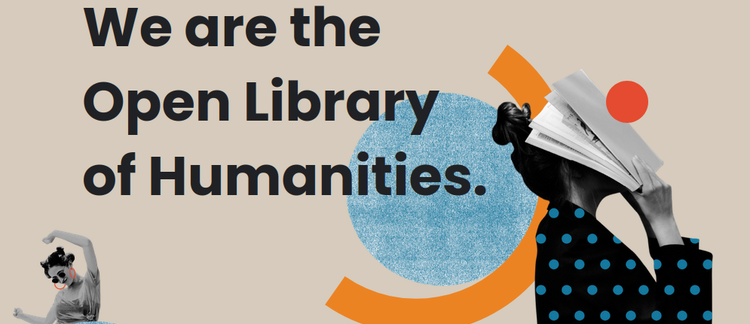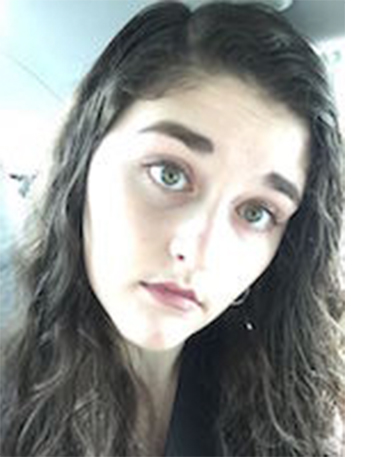A Year with the Open Library of Humanities
Posted by Dr Paula Clemente Vega on 29 November 2022



A Year with the Open Library of Humanities
A blog post by Lindsey Beth Zelvin, CHASE Editorial, Marketing and Technical Intern for OLH
 Lindsey Beth Zelvin is the CHASE Editorial, Marketing and Technical Intern for the Open Library of Humanities. She is coming to the end of a yearlong placement with OLH which she began in November 2021. Lindsey is in the second year of her PhD in Narrative Nonfiction at the University of Kent in Canterbury. Her work investigates the methodologies and ethical responsibilities involved in creating narrative representations of chronic mental illness. She is currently writing a hybrid memoir of her own lived experience with anorexia, anxiety, depression, and obsessive compulsive disorder.
Lindsey Beth Zelvin is the CHASE Editorial, Marketing and Technical Intern for the Open Library of Humanities. She is coming to the end of a yearlong placement with OLH which she began in November 2021. Lindsey is in the second year of her PhD in Narrative Nonfiction at the University of Kent in Canterbury. Her work investigates the methodologies and ethical responsibilities involved in creating narrative representations of chronic mental illness. She is currently writing a hybrid memoir of her own lived experience with anorexia, anxiety, depression, and obsessive compulsive disorder.
As a new PhD student, my priority upon arriving on campus last year was securing a job that would provide necessary experience relevant to my field as an academic within the humanities, as well as the financial support crucial for my current position as an unfunded student. The severe budget cuts seen by humanities departments over recent years have created an environment where funding for postgraduate students is virtually nonexistent, and viciously competitive. I felt, before I’d even had my first supervisory meeting, that I was beginning my degree at a disadvantage.
Immediately upon arriving on campus and registering with the university, I began searching for work opportunities. I registered with student employment services, scoured all calls for internships and part time work, and asked any and everyone who would listen about where to search for positions. I found the CHASE Doctoral Studentship page with a posting for a funded internship with the Open Library of Humanities. The job description was perfect. It was the introduction to academic publishing I needed, providing not only experience in editorial and marketing but also mentorship and contacts with prominent voices across a range of humanities disciplines. Based on their website alone, I was hooked.
I went into full research mode, exploring their main site to make myself a little cheat sheet for my interview with details from the About section, the Meet the Team page, the OLH Model description, the Open Insights series on their News page, and of course the flagship journal OLHJ. I then moved on to the Journals they host, reading all the descriptions and exploring a few of my favorites in case I was asked about them during the interview. What can I say, I’m thorough.
I’ll admit that I was a bit of a novice when it came to open access. I knew about it to the extent that I had experienced the massive hindrance produced by the lack of open access within the humanities. When applying for PhD programs, I wasn’t affiliated with an institution, meaning I didn’t have access to journal subscriptions and online monographs. I was stuck at home with only my local library and whatever open access resources I could find. With this experience fresh in mind, I was already disposed to be and advocate of increased open access for the humanities. After my interview, I was only more so. Talking to Rose Harris-Birtill [Deputy Director and Head of Editorial], Paula Clemente Vega [Marketing Officer], and Eleanor Careless [Former Editorial Officer], I got the sense that this was a place where I would have an opportunity to learn from likeminded, intelligent, compassionate individuals.
Upon joining the OLH team, I was quickly proven right. Never had I worked somewhere in which the people were both so genuinely fond of each other and equally dedicated to their organization’s mission. Everyone on the team was demonstrably passionate about extending and improving open access in the humanities and devoting their incredible skill to doing so. The team itself was surprisingly small, eight people in total, but their work was only made better by the fact that this was a group who clearly trusted and enjoyed being with each other in both a professional and personal context. I was welcomed into the fold right away with the team ensuring that I was introduced to multiple facets of the organization.
While working with Paula Clemente Vega, our Marketing Officer, I wrote my first press release within two weeks of joining the team. She also encouraged me to spend part of my first workdays reading co-founder Martin Paul Eve’s book Open Access and the Humanities, because she felt it was important that I understood the climate of the environment in which I would be working. I took copious notes, because I am a nerd, but also because it opened my eyes to all the ways in which an Open Access model is not only more equitable but also more effective for the dissemination and growth of humanities scholarship. This knowledge gave me incentive to work hard not just to impress my colleagues or build my reputation and skill set, but because I felt deeply connected to the mission driving the work that we were collectively undertaking. During my time working with Marketing, I participated in reviving the OLH newsletter, building our contact list of authors, librarians, and peer reviewers, and gathering statistics for our yearly report. The confidence Paula placed in me made me want to live up to her expectations; and thanks to her support and guidance, I now possess knowledge about outreach and public engagement that will be transferrable to any organization.
As a writer and academic, Editorial spoke directly to my heart and aspiration. Eleanor Careless [Former Editorial Officer], and then Simon Everett and Katherine Parker-Hay [Current Editorial Officers], took the time to include me in conversations about journal audits and editorial processes. They encouraged me to copyedit fascinating articles, and then took the time to provide feedback that made me both a better editor and a better writer. Again, I was trusted with responsibilities right off the bat. I reached out to indexing sites to make sure our journals were correctly listed, updating our information and applying for new listings. I learned about the back end of our website, sitting in on Janeway (our in-house software) training sessions to gain confidence in my ability to manage and edit our journals.
Everyone at OLH genuinely cares about the future of the organization. We are always thinking about how we can improve processes: our notation, our documentation, our outreach, our web presence. Anything and everything is subject to reflection to inform improvement. The team made a point of including me in these large sale tasks, as well as in checking in with me as a person, not just as a team member. In addition to our weekly meetings, we scheduled ‘away days’ where we focused on future innovations for OLH. Everyone’s voices mattered; it was difficult to maintain my ‘just an intern’ timidity when I was frequently reminded that my ideas, suggestions, and questions were valuable. I cannot overstate how rare, special, and important that is. Even the Technical Team, to which I assumed I could contribute little of use, were friendly and thoughtful, responding to questions with kindness and good humor. I would say I wish I’d gotten more of an opportunity to work with them directly, but my awareness of my lack of coding skills held me back from making this a reality. Even so, I’ve learned so much just from listening to them discuss their ideas, accomplishments, and processes, and I will forever be infinitely impressed by their innovations.
Without the experience of this past year, I would not have felt ready to take on an associate editorial or marketing role, now I feel more than prepared to move into the next step of my professional life. And more than that, I’m excited to do so.
But, as grateful as I am for the knowledge and skills that I’ve gained from my time working specifically within Marketing and Editorial, what I will miss most about OLH is the collaboration, community, and creativity. OLH gave me a community when I desperately needed one. They provided guidance and support as I found my way, both as their intern and as a first year PhD student. They included me in their Secret Santa and invited me out for drinks. They read over my studentship applications and offered to provide letters of recommendation for future positions. They offered kindness and a listening ear when I was struggling. And all this, while maintaining a brilliant organization that does such important work.
I wish I could stay with them longer. Unfortunately, however, my placement is coming to an end, and it’s time for another person to get the chance to work with this wonderful team. I will always treasure my time with OLH. They introduced me to the world of academic publishing and open access, and they helped me develop into a more independent, assertive, and efficient person. I thank them for my growth in confidence not only in my editorial, marketing, and outreach skills, but also in my ability to contribute to the development of an organization. I leave them knowing my worth, both as a person and an employee, and I will always count them as dear friends and mentors. Therefore, I refuse to say goodbye to the Open Library of Humanities. Instead, I will say ‘Until next time.’ Thank you for everything.
The OLH team would like to thank Lindsey Beth Zelvin for all her incredible work during this last year and wish her the best of luck with her PhD!
Featured image by Carlos via Unsplash.
